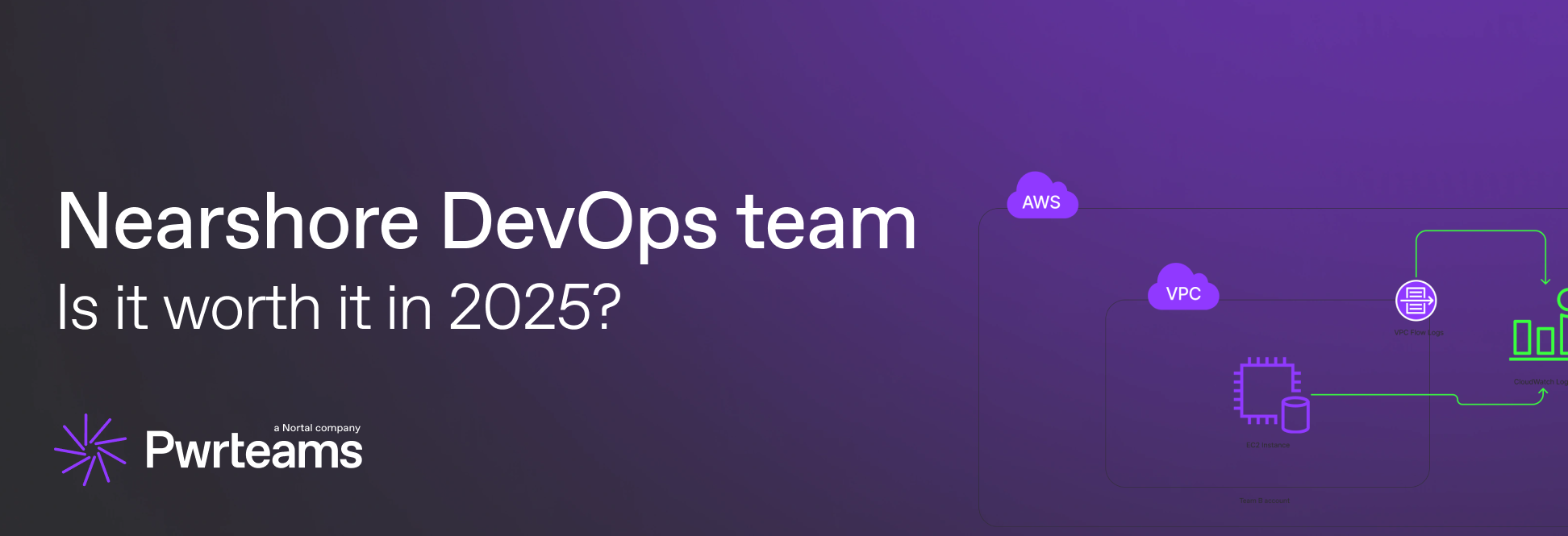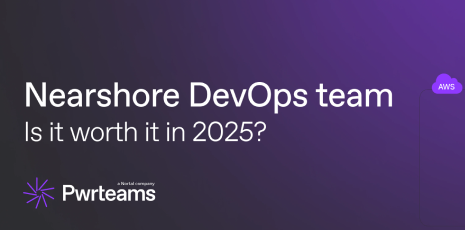The pros & cons of a nearshore DevOps team in 2025


As we step into 2025, DevOps has evolved far beyond its initial role of bridging development and operations. Today, it is a cornerstone of digital transformation, helping businesses achieve agility, scalability, and continuous innovation. But as organisations adapt to modern demands, the debate over building in-house DevOps teams versus leveraging nearshore or outsourced solutions persists.
In this article, we’ll explore the updated pros and cons of nearshore DevOps teams, dive into emerging trends like AI-powered automation and cloud-native strategies, and discuss how businesses can make informed decisions when choosing the best approach for their DevOps strategy. It updates our original 2018 piece.
DevOps services for businesses in 2025
The core principles of DevOps—rooted in Lean practices and Agile methodologies—remain just as critical today as when they first emerged. However, the landscape of 2025 brings with it new challenges and opportunities. With the rapid adoption of cloud-native technologies, AI-driven solutions, and infrastructure as code (IaC), businesses are leaning on DevOps more than ever to drive innovation, reliability, and scalability.
What modern DevOps services deliver?
-
Empowering Cross-Functional Collaboration
DevOps is about breaking down silos, creating a culture of collaboration across teams, and integrating continuous feedback loops for faster development cycles. -
Enabling Continuous Everything
CI/CD has matured into "continuous everything"—from testing and integration to delivery and even large-scale deployments. The result is a seamless flow of innovation. -
Embedding Security from the Start (DevSecOps)
Security is no longer an afterthought. In 2025, it’s an integral part of the software development lifecycle (SDLC), addressing vulnerabilities before they escalate.
Modern DevOps has moved far beyond facilitating software deployment. Today’s DevOps teams handle critical responsibilities like observability, monitoring, and security, which account for 54% of their efforts. This shift highlights the indispensable role of DevOps in managing complex IT ecosystems.
Why distinguish DevOps as a service in 2025?
In 2025, DevOps as a Service (DaaS) has become a pivotal solution for businesses navigating hybrid and multi-cloud environments. Here’s what modern DaaS providers bring to the table:
-
Cloud-Native Expertise
Skilled in tools like Kubernetes, Docker, and platforms such as AWS, Azure, and GCP, DaaS providers simplify the management of containerised workloads. -
AI and Machine Learning Integration
Leveraging AI, modern DevOps teams can optimise pipelines, predict potential failures, and enhance incident response, making processes more efficient and proactive. -
GitOps and Infrastructure as Code (IaC)
Using Git-based workflows, DaaS ensures infrastructure updates are consistent, traceable, and error-free.
Public cloud platforms remain the leading choice for DevOps, but hybrid and multi-cloud strategies are increasingly prevalent. DaaS enables businesses to stay competitive by offering scalable, cloud-native solutions tailored to evolving market needs.
Adopting modern DevOps practices - through in-house teams or trusted DaaS providers - will be a key differentiator for organisations aiming to thrive in this rapidly changing environment.
The benefits of nearshore DevOps teams in 2025
-
Cost Efficiency Without Compromising Quality
Nearshore DevOps teams remain a cost-effective solution. In 2025, nearshore rates are, on average, 46% lower than onshore alternatives. Companies can reinvest these savings into innovation, new technologies, and market expansion while still accessing high-quality talent. -
Real-Time Collaboration in Shared Time Zones
Time zone alignment facilitates seamless communication and collaboration. Nearshore teams can actively participate in Agile sprints, ensure faster issue resolution, and support continuous delivery workflows without delays. -
Cultural Compatibility
Proximity often brings cultural similarities, which minimise misunderstandings and promote smoother cooperation. Nearshore partners tend to share business ethics and work practices, an advantage over offshore models. -
Access to Specialised Skills
With the complexity of cloud-native architectures, AI integration, and edge computing, having access to specialised expertise is essential. Nearshore teams are well-versed in managing advanced CI/CD pipelines, distributed systems, and cutting-edge DevOps tools. -
Scalability and Adaptability
The flexibility to scale teams up or down based on project needs is invaluable in 2025’s fast-paced environment. Nearshore DevOps partners can quickly adapt to evolving requirements, helping businesses maintain a competitive edge.
Challenges of nearshore DevOps teams
Every situation has its pros and cons. External DevOps team comes with challenges and is not a one-size-fits-all solution for every business. To make a well-informed choice, consider these potential downsides.
- Language and Communication Barriers
While less pronounced than with offshore teams, occasional language nuances or communication gaps can arise. Although translation tools have advanced, they cannot always replace human understanding. - Data Security and Compliance
DevOps practices involve handling sensitive data. Ensuring compliance with global data protection regulations requires careful vetting of nearshore partners’ security certifications and processes. - Integration Complexities
Merging nearshore teams with existing in-house workflows requires thoughtful planning. Misalignment in tools, methodologies, or expectations can create bottlenecks. - Hidden Costs
Travel expenses, additional project management efforts, and regulatory compliance costs can add up, partially offsetting initial savings. - Infrastructure Dependence
Despite improvements in global internet infrastructure, some nearshore locations may still face occasional connectivity issues, disrupting real-time collaboration.
New considerations for 2025
The nearshore DevOps model has expanded to meet modern technological demands. Here are the key trends shaping the DevOps landscape in 2025:
-
AI and Machine Learning in DevOps
Nearshore teams must stay ahead by mastering AI-driven tools for pipeline optimisation, anomaly detection, and incident response. -
Cloud-Native and Edge Computing
Proficiency in Kubernetes, Docker, and cloud platforms like AWS and GCP is now table stakes. Nearshore teams also need expertise in managing edge deployments for latency-sensitive applications. -
DevSecOps Integration
Security is embedded throughout the software development lifecycle. Nearshore partners must prioritise strong cybersecurity practices to address rising threats. -
Sustainability in DevOps
Green IT practices are gaining importance. Nearshore teams are increasingly tasked with adopting sustainable approaches to software development and infrastructure management.
Is a nearshore DevOps team right for you?
Choosing the right DevOps strategy depends on your organisation’s priorities. Nearshore teams are ideal for businesses seeking cost efficiency, specialised skills, and cultural alignment. However, challenges like integration and data security require careful consideration.
As technology evolves, having a trusted partner who understands emerging trends and practices is critical. Whether in-house, nearshore, or outsourced, the ultimate goal is to leverage DevOps to deliver continuous innovation, reliability, and scalability in an increasingly complex world.
Why Pwrteams for DevOps team augmentation?
At Pwrteams, we bridge the gap between need and expertise, aligning the right skills at the right time to ensure your goals are met seamlessly. Our DevOps engineers don’t just join your projects—they become an extension of your team, fostering collaboration and driving success through finely tuned continuous delivery processes.
With a robust pool of experts proficient in automation, orchestration, and cloud-native solutions, we provide the talent you need to thrive. From managing Kubernetes to building advanced CI/CD pipelines, our engineers combine technical mastery with a deep commitment to the DevOps philosophy.
But not for our clients!"
True collaboration takes time, and we’re dedicated to building relationships that last. By embedding ourselves in your organisational culture, we preserve your values while helping you scale with agility and precision.
What’s the key to staying ahead in today’s fast-paced tech world? Flexibility. Whether you’re scaling teams, tackling complex cloud architectures, or addressing evolving cybersecurity threats, our tailored engagement models adapt to your unique needs, driving success on your terms.
 September 29, 2025
September 29, 2025
Build your team or extend with ours? Here’s what helps fintech CTOs decide
Read the post September 10, 2025
September 10, 2025
Fixed-price projects vs dedicated teams: A fintech CTO comparison
Read the post September 3, 2025
September 3, 2025
How burnout is crippling tech leadership in the Nordics and Benelux
Read the post September 29, 2025
September 29, 2025
Build your team or extend with ours? Here’s what helps fintech CTOs decide
Read the post September 10, 2025
September 10, 2025
Fixed-price projects vs dedicated teams: A fintech CTO comparison
Read the post September 3, 2025
September 3, 2025
How burnout is crippling tech leadership in the Nordics and Benelux
Read the postWrite your own
success story
with Pwrteams!
Share your details in the form, tell us about your needs, and we'll get back with the next steps.
- Build a stable team with a 95.7% retention rate.
- Boost project agility and scalability with quality intact.
- Forget lock-ins, exit fees, or volume commitments.